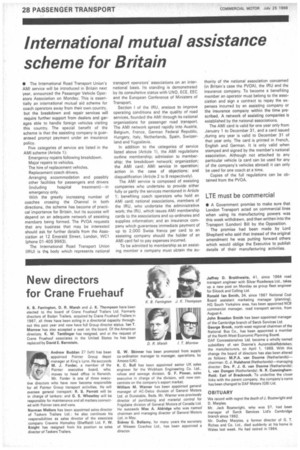International mutual assistance scheme for Britain
Page 30

If you've noticed an error in this article please click here to report it so we can fix it.
• The International Road Transport Union's AMI service will be introduced in Britain next year, announced the Passenger Vehicle Operators Association on Monday. This is essentially an international mutual aid scheme for coach operators away from their own country, but the breakdown and repair services will require further support from dealers and garages able to handle foreign vehicles visiting this country. The special benefit of the scheme is that the assisting company is guaranteed prompt payment under an insurance policy.
Five categories of service are listed in the AMI scheme (Article 1):
Emergency repairs following breakdown. Major repairs to vehicles.
The hire of replacement vehicles.
Replacement coach drivers.
Arranging accommodation and possibly other facilities for passengers and drivers (including hospital treatment)—in emergency only.
With the greatly increasing number of coaches crossing the Channel in both directions, the scheme has become of practical importance for Britain, but its success will depend on an adequate network of assisting members being formed. The PVOA requests that any business that may be interested should ask for further details from the Association at 12 Emerald Street, London, WC1 (phone 01-40599631.
The International Road Transport Union )IRU) is the body which represents national transport operators' associations on an international basis. Its standing is demonstrated by its consultative status with UNO, ECE, EEC and the European Conference of Ministers of Transport.
Section I of the IRU, anxious to improve operating conditions and the quality of road services, founded the AMI through its national organizations for passenger road transport. The AMI network spread rapidly into Austria, Belgium, France, German Federal Republic, Hungary, Italy, Netherlands, Spain, Switzerland and Yugoslavia.
In addition to the categories of service listed above (Article 1), the AMI regulations outline membership; admission to membership; the breakdown network; organization;
the AMI card; AMI service in operation: action in the case of objections; and disqualification (Article 2 to 9 respectively).
The AMI service is composed of assisting companies who undertake to provide either fully or partly the services mentioned in Article 1; benefiting coach operators who hold an AMI card: national associations, members of the IRU, who undertake the administrative work; the IRU, which issues AMI membership cards to the associations and co-ordinates and supplies information; and an insurance company which guarantees immediate payment of up to 2,000 Swiss francs per card to an assisting company should the holder of an AMI card fail to pay expenses incurred.
To be admitted to membership as an assisting member a company must obtain the au thority of the national association concerned (in Britain's case the PVOA), the IRU and the insurance company. To become a benefiting member an operator must belong to the association and sign a contract to repay the expenses incurred by an assisting company or the insurance company within the time prescribed. A network of assisting companies is established by the national associations.
The AMI card is valid for one year only from January 1 to December 31, and a card issued during any year is valid to December 31 of that year only. The card is printed in French, English and German. It is only valid when stamped and signed by the member's national association. Although not attached to any particular vehicle (a card can be used for any of the company's vehicles abroad) it can only be used for one coach at a time.
Copies of the full regulations can be obtained from the PVOA.
LTE must be commercial
• A Government promise to make sure that London Transport acted on commercial lines When using its manufacturing powers was this week withdrawn, and then written into the Transport (London) Bill by the Opposition.
The promise had been made by Lord Shepherd who said that instead of the original amendment he was putting forward others which would oblige the Executive to publish details of their manufacturing activities.
















































































































